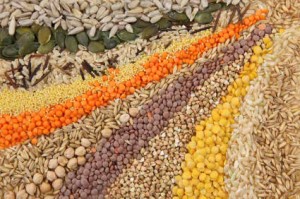If you’re anything like me, you spend some of these cold, blustery winter evenings leafing through a stack of garden catalogs, dreaming of the gardens to come.
While we have a lot of space, I know my gardening dreams becomes a bit larger than my energy levels and by mid-summer and I am sending barbs at those enticing seed catalogs,
Nevertheless, this year’s quest has been for non-GMO seeds.
About a year ago, I wrote about how GMO giant Monsanto is gobbling up seeds companies like there is no tomorrow. If Monsanto gets its way, there a questions whether there will be a tomorrow or a world for our children and grandchildren.
It is to everyone’s benefit to keep Monsanto out of our gardens as well as off our tables.
Monsanto grabbed 20% of the global seed market in 2005 when it bought out Seminis, the largest developer, grower and marketer of fruit and vegetables in the world.
Seminis,k under Monsanto’s auspices, supplies the genetics for 55% of the lettuce on U.S. supermarket shelves, 75% of the tomatoes and 85% of the peppers, with strong holdings in beans, cucumbers, squash, melons, broccoli, cabbage, spinach and peas.
If this sounds loike a dark conspiracy to control the world’s food supply, I won’t argue with you.
55% of the lettuce on U.S. supermarket shelves, 75% of the tomatoes, and 85% of the peppers, with strong holdings in beans, cucumbers, squash, melons, broccoli, cabbage, spinach and peas!
So this year’s quest has been for non-GMO seeds and those sold by companies not controlled by or supplied by Monsanto. It’s a lot harder than you might think.
While heirloom and certified organic seeds might be free of GMOs, they may be sold by companies related to Monsanto in some way, therefore you can’t be sure.
For example, Seminis’ non-GMO seeds are carried by many popular garden catalogs, including Park Seed, Burpee, Territorial Seeds, and Johnny’s Selected Seeds.
It gets even more diabolical: So Monsanto is buying up seed companies whose products are the result of generation of research and labor by traditional agricultural methods.
Then they can slip a “Round-Up Ready” or other proprietary gene into it and call it their “own”, and sell it with patent restrictions. This means that Monsanto can eventually control the entire global seed market and —oh horrors!– control the entire world food supply. Forget about politics, he who controls food controls the world.
Sorry. Maybe I got a little carried away there. Or not.
Down to the heart of the matter:
-
Buy from this list of companies that Monsanto HASN’T bought and are not affiliated with or do business with Seminis. NOTE: This list is a postcard. Other links seems to have mysteriously disappeared from the web. The Occupy Monsanto list has disappeared. Hmmm.
-
Avoid certain heirloom varieties because Monsanto now apparently owns the names (not necessarily the seeds, just the names). This article lists the seed varieties to avoid.
-
Ask seed companies if they have taken the Safe Seed Pledge. Here’s a list of companies that have done so.
- Avoid seeds of plants at big box stores that carry Seminis or Monsanto names on their labels. This includes some mof hte most popular tomato varieties like ‘Celebrity,’ ‘Early Girl’ and ‘Better Boy,’ as well as other common home garden varieties, like ‘Cheddar’ cauliflower and ‘Marketmore 76′ cucumbers.








This has taken Monsanto quite a few years to accomplish, but they are almost there. What can the average person do? I’m sure even the farmers’ markets are selling GM foods. People just aren’t paying attention. It seems that if you don’t eat organic fruits and veggies you are not guaranteed they are GMO free …
Thank you Kathleen for taking the time to post your thoughtful struggle with this issue. I ran across your post in my own search for pure seeds and seed companies that sell them.
I’ve only recently discovered through my own digging that I may have been supporting the “big 6” biochemical companies inadvertently. I thought that buying from companies that have taken the “Safe Seed Pledge” or sold “USDA Organic & Heirloom” seed was good enough. It is not so! It’s come to my attention that a couple of the companies I’ve long trusted, Territorial Seed Company and Ed Hume Seeds, both claim the Safe Seed Pledge (in that they don’t sell GMO seed) and yet they continue to sell Syngenta & Seminis seeds! Imagine my horror to find that I had retail packages of the offending corporations like Monsanto & Syngenta in my own garden seed box!
With that discovery I began my slog through the Ag catalogs to see if any of the seed I’d purchased was a GMO or treated with insecticides and such. Low and behold, I found those same trademarked brands of seeds listed right alongside the genetically engineered BT corns! It also allowed me to see that they make a distinction between seed for the home garden and for commercial farmers. I was relieved to find that as a home gardener, I can’t get a GMO seed without signing a contract with the biochemical company since some seeds are patented life forms. WHEW! I’m not growing a GMO in my garden. What it did do, was make me aware of the brand names of the seeds I am buying and which companies still sell Syngenta & Seminis (Monsanto) seeds!
So now the hard part. How can I keep my dollars from flowing to the companies that are diametrically opposed to the values I hold dear? (namely, buying sustainable organic, open pollinated, heirloom varieties that help continue the genetic diversity of seeds I can grow in my own garden) Well, its difficult! I can’t just grab an “organic” packet off the rack anymore since those seed companies may be repackaging Syngenta & Seminis seeds under their own labels!
What can we do? We can continually challenge companies to keep those values by divesting themselves from the biochemical companies. By reaching for seeds that are from companies that not only have taken the Safe Seed Pledge, but by checking to make sure that they are true to the spirit of genetic diversity and not just giving it “lip service” or using the Safe Seed Pledge as a marketing tool. I’ve also started challenging the companies directly on their Facebook pages about their commitment to the SSP. Here’s an excerpt of what I wrote on the Ed Hume Seeds Facebook page “Your seeds are not GMO? Anybody that’s done a little research knows seeds marketed for home gardens CAN’T be a GMO. You’ve got to sign a contract to get those. What CAN be said is that Ed Hume Seeds sells #Syngenta seeds, from one of the “big 6” biochemical companies! #Syngenta and #Seminis are both divisions of, or associated with #Monsanto! We need companies true to the “SafeSeedPledge”. #EdHumeSeeds has NOT taken that pledge! Honey Select is a registered Syngenta seed! http://www.humeseeds.com/cornhs.htm”
That has resulted in them deleting my Facebook posts and gotten me banned by Ed Hume Seeds. Thankfully Territorial Seed is still responding!
Since I’ve decided I don’t want to support biochemical companies in my garden if its humanly possible, I’ve started the task of finding ways to reliably confirm that the seed companies I buy from are in fact NOT sourcing their seeds from Seminis or Syngeta. That is proving to be a hard row to hoe! I’ve found a few “cultivars” databases that allow me to actually reference the brand name of the seed to verify who has developed it and where its sourced from.
Here are links to two databases. They aren’t as up to date as they could be, but they are a start!
http://ashs.org/cultivars/index.lasso
http://cuke.hort.ncsu.edu/cucurbit/wehner/vegcult/
I’ve also started compiling a list of companies that I have checked for Syngenta & Seminis branded seed varieties. That list is incomplete and I will post it when I feel its reasonably accurate. On a side note, I was able to retrieve the list of seed companies from “Occupy Monsanto 360” website that disappeared. If you’d like that, just let me know. Lets hope that with the work that you’ve done and with help from others we can gain knowledge and find tools to help us make educated choices in how we grow, feed and build our families!
Keep up the good work, fight the good fight!
Thanks, Cee Are for taking the time to do even more research. It is getting more and more difficult to find seeds that the bad guys don’t have their greedy paws on. I suggest we all buy heirloom varities this year, save seeds and start up local seed exchanges. ~Kathleen
I agree Kathleen, let’s start a seed bank !